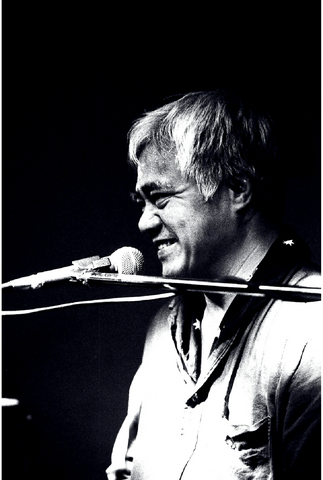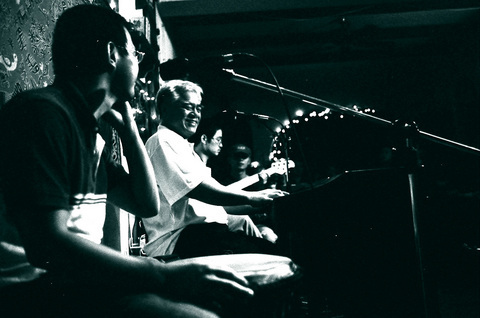In the 1970s Kimbo, or Tuko Mackaruwane in his native Puyuma language, was known as Taiwan's Bob Dylan, blending Taiwanese Aboriginal sounds into his poetry and folk music.
Named Hu Defu (
Produced by Cheng Chieh-ren (

"It's hard not to be touched by Hu's natural yet powerful voice," said Lee Kun-yao (
Back then, Kimbo was Taiwan's highest paid folk singer, earning up to NT$25,000 a month -- at a time when the monthly salary of a Cabinet minister was NT$7,000 per month.
"Maybe my songs were too heavy for the market or to package for commercial record companies. They were written not for publishing purposes in the first place," Kimbo said in a cafe in Taipei, a cigarette constantly in one hand.

PHOTOS COURTESY OF IGNITE FIRE
Kimbo said he is not a prolific songwriter. He writes about one song a year, each one written, he said, after the pain in his body, heart and soul had reached a cresting point.
"If a song cannot move me to an unbearable degree, I would not publish the song," he said.
The blues he feels is from his 30-year involvement in Taiwan's political, social and Aboriginal movements. In all of these upheavals over the years, Kimbo's role hasn't been that merely of the protest singer, but rather he has been the frontman and organizer of many demonstrations.
In the 1980s Kimbo was a member of the tangwai (
Hu was among the first to talk about reclaiming land from Han Chinese-owned businesses and from the government, preserving Aboriginal names and raising the issue of Aboriginal girls being forced into prostitution.
Even in 1999, a decade after the peak of Taiwan's political and social movements, when the 921 earthquake devastated 90 percent of Aboriginal villages in central Taiwan, Kimbo emerged again, leading clashes with police over unfair treatment of Aboriginal villagers.
When Lien Chan (
All these actions and sentiments have been accumulated and encapsulated in his songs.
The Longest Road (
Darter, Clouded Leopard, The Basin Of Taipei (
Kimbo also wrote folk songs, such as The Boy On The Buffalo's Back (
Kimbo's singing talent took root in his high school years at Taipei's Tam-kang High School, a religious school set up by the missionary George Leslie Mackay. Students were trained to sing psalms and choral songs every morning and to play rugby every afternoon.
"I remember all the boys who loved to sing formed quartets and competed with each other every morning," Kimbo said.
He recalled a nun named Ms Taylor, who introduced Scottish folk songs and American Southern spirituals to the boys.
"I was naturally drawn to the rhythm of blues and spirituals and was gradually influenced by these vocal styles," Kimbo said.
"Little by little, I began to understand the content of spirituals and found lots of similarities with Taiwanese Aboriginal music. The repeating patterns of the blues are very similar to some music styles in Puyuma Paiwan music.
"The lyrics of Aboriginal folk music, like spirituals, tell about suffering. But I feel there is more praise to nature in Taiwanese Aboriginal music, instead of just telling about the pain," Kimbo said.
Romanticism and spontaneity seem to always drive Kimbo, making him a pioneer in many other businesses outside his folk music and social-movement activism.
He and friends opened Taiwan's first teppanyaki restaurant in Taipei in 1970. He was also once a partner in Taiwan's leading toy business. But these businesses were all flash-in-the-pan affairs, like many of the short-lived protest campaigns.
His free-spirited style demonstrates Kimbo's talent, but it is also sometimes a source of trouble for his producers. For instance, he never sings the same lyrics twice. Two years ago, it took him two hours to shoot a 20-second music video clip because he could not sing the same lyrics in front of the camera.
"I've sung that song tens of thousands of times. None of the times have I sung the same lyrics," he said.
Now Kimbo has decided to redirect his focus toward music, his one passion.
"I decided that this time I would lay down everything else and start to treat my music, especially Aboriginal music, with respect," Kimbo said.
As Time Flashes is meant to be a summing-up of his past musical career so that he can begin pursuing his new musical passions.
"I want to systematically explore the heritage of Aboriginal music, especially the abundant use in Aboriginal music of words like ho hai yan which don't actually have any meaning. I want to explore the beauty of these words and blend their usage into my own music,"
He will also work more closely with young Aboriginal musicians and music producers to help develop new talent.
"There are so many beautiful voices among the younger generation Aboriginal musicians. Unlike me. Only my heart still rocks," Kimbo said with a laugh.

Google unveiled an artificial intelligence tool Wednesday that its scientists said would help unravel the mysteries of the human genome — and could one day lead to new treatments for diseases. The deep learning model AlphaGenome was hailed by outside researchers as a “breakthrough” that would let scientists study and even simulate the roots of difficult-to-treat genetic diseases. While the first complete map of the human genome in 2003 “gave us the book of life, reading it remained a challenge,” Pushmeet Kohli, vice president of research at Google DeepMind, told journalists. “We have the text,” he said, which is a sequence of

On a harsh winter afternoon last month, 2,000 protesters marched and chanted slogans such as “CCP out” and “Korea for Koreans” in Seoul’s popular Gangnam District. Participants — mostly students — wore caps printed with the Chinese characters for “exterminate communism” (滅共) and held banners reading “Heaven will destroy the Chinese Communist Party” (天滅中共). During the march, Park Jun-young, the leader of the protest organizer “Free University,” a conservative youth movement, who was on a hunger strike, collapsed after delivering a speech in sub-zero temperatures and was later hospitalized. Several protesters shaved their heads at the end of the demonstration. A

Every now and then, even hardcore hikers like to sleep in, leave the heavy gear at home and just enjoy a relaxed half-day stroll in the mountains: no cold, no steep uphills, no pressure to walk a certain distance in a day. In the winter, the mild climate and lower elevations of the forests in Taiwan’s far south offer a number of easy escapes like this. A prime example is the river above Mudan Reservoir (牡丹水庫): with shallow water, gentle current, abundant wildlife and a complete lack of tourists, this walk is accessible to nearly everyone but still feels quite remote.

In August of 1949 American journalist Darrell Berrigan toured occupied Formosa and on Aug. 13 published “Should We Grab Formosa?” in the Saturday Evening Post. Berrigan, cataloguing the numerous horrors of corruption and looting the occupying Republic of China (ROC) was inflicting on the locals, advocated outright annexation of Taiwan by the US. He contended the islanders would welcome that. Berrigan also observed that the islanders were planning another revolt, and wrote of their “island nationalism.” The US position on Taiwan was well known there, and islanders, he said, had told him of US official statements that Taiwan had not